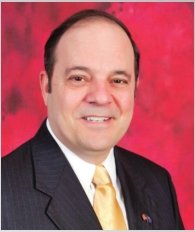A crowded August primary for Ingham County’s Board of Commissioners will determine which Democratic candidates will face off against their Republican challengers in November.
City Pulse reached out to each of the 15 candidates seeking election in contested races to discuss their priorities.Two candidates didn’t return phone calls. One has since suspended her campaign. The remaining 12 candidates offered their perspectives on a number of topics, but budgetary acumen, road improvements, millage requests, unfunded liabilities and regional collaboration took center stage.
Road improvements
More than 40 percent of Ingham County’s primary roads last year were rated in “poor” condition under the state’s Pavement Surface Evaluation and Rating system, according to data provided by the county’s road department. Each candidate emphasized a commitment to help rebuild local infrastructure.
Walt Sorg said taxpayers will ultimately need to float the bill if they want to get the ball rolling on repairs sooner than later. They called for a hefty bond issue backed by a voter-approved millage to net the revenue needed for longer term investments in the county’s crumbling streets.
“It’s unusual to campaign on the idea that we need to raise taxes,” Sorg added. “I’m not afraid to say that. We need to be honest with the people. It’s going to cost hundreds of millions of dollars to fix every road in Ingham County. We need to get our roads fixed. It’s hurting us in terms of economic development.”
Emily Stivers suggested the county would need at least $200 million in bonds to begin work immediately and emphasized that voters should have a voice in the scheduling process. Others — including Todd Tennis and Chris Trubac — were undecided on whether the county should be filling a funding gap on behalf of state legislators.
Tennis said he would prefer an additional 1-cent gasoline tax and noted a countywide millage would be sure to raise concerns about the adequate distribution of resources. Trubac said reduced revenue sharing from the state has made roads worse than anticipated and noted enhanced local funding could reduce pressure on lawmakers.
“The state is actually supposed to fund these repairs and reconstruction,” Trubac said. “I’m torn on this one.”
Thomas Morgan said corporations and developers need to pay their “fair share” amid the countywide effort to improve roads. He pushed for better negotiations on future developments and — like nearly every candidate interviewed — suggested proper long-term planning could go a long way in determining the best path forward.
Milton Scales was the only candidate to take a firm stance against a potential road construction millage. He — like Dennis Louney — suggested enhanced regional collaboration could instead help reduce any potential financial commitment from county taxpayers, also noting a solid list of priorities should always come first.
“It may take a 20-year plan in order to fully fund (road) reconstruction,” added Linda Burghardt. “It has to be done. We may have to bite that bullet but I think it’s a little too early to (consider a countywide millage). I just don’t know enough about the funding issues and other constraints. I just know we need to do something.”
Justice millage
When voters they select their commission candidates later next month, they will also have an opportunity to approve a millage request that would ultimately fund a modernized jail, additional office space and new courtroom facilities in Mason. Some candidates expressed their hesitation, but everyone recognized the need.
Robert Pena said he’ll vote in favor of the initiative but suggested additional dollars should also be dedicated to the region’s school system amid an effort to reduce the number of would-be criminals entering into the facility.
“These issues go hand in hand,” Pena added. “If we don’t educate our young people, they’re going to get into problems. That escalates into heavier crime so I think we need to do a little more at the forefront of this. But I’m for the jail because we need it. We need to treat these people humanely. These people will come back out.”
Derrell Slaughter — like Mark Polsdofer — suggested enhanced efficiencies could lead to additional mental health programming for inmates, which ultimately led them to support the project. Slaughter also wants to keep a close eye on the construction to ensure the county is getting the best possible bang for its buck, he said.
Others were critical but supportive of the proposed reinvestment in Mason. Officials said most inmates lodged at the facility arrive from Lansing. Sorg suggested thousands could be inconvenienced by the cross-county drive (or bus trip) to the county seat. Morgan said he doesn’t think voters are concerned with the jail’s condition.
“It’s nothing but continued sprawl,” Morgan added. “I’d also like to see more money be spent on educating people rather than imprisoning them. Is the new jail a top priority? That’s not what I hear when I go door to door.” He added that he would be more supportive if the jail were going to be centrally located in Lansing.
Vincent Dragonetti said he was unsure how he felt about the proposal but understood the need for improvement. Others, like Louney, said it could be more financially responsible to replace the facilities rather than continue to pour hundreds of thousands of taxpayer dollars into annual maintenance at the jail.
Tennis expressed hope the “sorely needed” initiative will pass and said the potential for a cost-saving collaboration with Lansing and East Lansing and other jurisdictions is still a viable route forward. Discussions over cost sharing and liability issues have caused headaches on the board in the past but the jail can’t wait for a perfect solution, he said.
“We’re always looking at ways to coordinate services,” Tennis added. “But in many cases, the municipalities that help to pay into these collaborations still want to stay in control. That’s where we start to have our differences.”
Unfunded liabilities
Ingham County — with about $474.6 million in pension liabilities and retiree healthcare obligations — will require some budgetary skill to keep its finances out of the hands of state regulators, officials said. Commissioners for years have chipped away at unfunded legacy costs, but it will likely remain a focus for years.
Most candidates claimed to have the experience necessary to maneuver budgets and ensure the county’s outstanding pension and healthcare obligations, funded at 67 and 14 percent, respectively, will continue to meet the needs of those who retire from the county each year.
Slaughter said special millages shouldn’t be the first solution to dealing with complex financial problems. He suggested the county needs to find a way to navigate its unfunded debts without jeopardizing services to local residents. Stivers also voiced concerns about “millage fatigue” should commissioners make another request.
“Folks don’t realize our budgets are being balanced on the back of our reserve funds,” Dragonetti added. “We’ve got to start making smarter decisions. … We’ve got to get back to the basics. We keep saying that (special millages) will fix these things, but some of the people being hurt the most are those with lower incomes.”
Some suggested the state could be doing more to allow counties to expand their revenue sources. Trubac hopes to advocate for continued reform in both chambers of the legislature, using his enhanced “visibility” to direct attention to larger financing issues and push back against legislators “that don’t want to play ball.”
“It comes down to revenues,” Morgan added. “We need to have more revenue coming into the county and we need to break the stranglehold that corporate lobbyists have with all these tax abatements.
It’s ludicrous to hand out massive tax breaks to developers and corporate interests. The county has a massive responsibility here.”
Burghardt and Louney said commissioners first need to establish a countywide asset management plan to better set their priorities before they can go about affecting change and whittling down out standing debts. Pena said some projects and plans may need to be paused while the county comes to grips with its existing obligations.
“We’re spending money on all kinds of projects all over the county but we really need to step back and take care of our weakest members,” Pena added. “We need to adjust our budgets and ensure everyone receives attention.”
Polls are open from 7 a.m. to 8 p.m.
Aug. 7. The registration deadline has passed for the primary election, but the window for the Nov. 6 general election is open through Oct. 9. Visit michigan.gov/ elections for additional information.
kyle@lansingcitypulse.com
No profile available for two candidates
Several calls to 5th District Democratic challenger Chris LaMarche were not returned to the Lansing City Pulse. He also ignored a questionnaire from The Lansing Area Association for Human Rights, according to its rating website.
Democrat Alexia Mansour — the first candidate to file in District No. 12 — said she is no longer seeking election to the office “due to family obligations and personal reasons.” She said her priority was to ensure a Democratic woman found her way into the office, and she is “confident” her challengers are capable of filling that role. Democratic challenger Jessica Hamel will also appear on the ballot but she didn’t return several phone calls.

Walt Sorg, Democrat
Age: 68
Residence: Lansing
District: Third (Southwest Lansing)
Sorg is a communications professional with decades of experience in economic development, public policy, broadcast and journalism. He has a bachelor’s degree in business communication from Thomas A. Edison State University and has received numerous awards over his professional career, holding key leadership positions both within various state agencies and through his privately founded communications consulting company. Sorg also previously worked as a contributing writer and columnist for City Pulse. The Lansing Area Association for Human Rights gave Sorg a “very positive” rating.

Todd Tennis, Democrat
Age: 47
Residence: Lansing
District: Fifth (Southeast Lansing)
Tennis has served as a county commissioner for the last 12 years. He has a bachelor’s degree in political science from the University of Michigan and is the president of a lobbying firm, Capitol Services Inc. He touted endorsements from the Greater Lansing Labor Council, the UAW and several local officials like Mayor Andy Schor, Senator Curtis Hertel, Commissioner Sarah Anthony, County Clerk Barb Byrum and Lansing Councilman Peter Spadafore. The Lansing Area Association for Human Rights gave Tennis a “very positive” rating.

Vincent Dragonetti, Democrat
Age: 70
Residence: Holt
District: Seventh (Portions of South Lansing and Delhi Township)
Dragonetti has spent the last 30 years working in private-sector real estate, securities, insurance and investments. He teaches at Lansing Community College and has a bachelor’s degree in business from Michigan State University. Dragonetti previously served as a county commissioner before he was defeated in a bid for reelection and touts experience working with the Michigan Education Association and with multiple labor unions. The Lansing Regional Chamber of Commerce has also endorsed his campaign. The Lansing Area Association for Human Rights gave Dragonetti a “negative” rating.

Derrell Slaughter, Democrat
Age: 31
Residence: Lansing
District: Third (Southwest Lansing)
Slaughter is an analyst for the Michigan Public Service Commission and the chairman of Ingham County’s Board of Health. He has a bachelor’s degree in public policy from Michigan State University and touts involvement with the Old Everett Neighborhood Association, the county’s Democratic Party and the American Civil Liberties Union. He said he received endorsements from the UAW, Greater Lansing Labor Council, United Association of Plumbers and Pipefitters Local 333, Michigan Education Association and LaunchProgress. Slaughter said county commissioners, Lansing City council members and Sheriff Scott Wriggelsworth have pledged their support. The Lansing Area Association for Human Rights gave Slaughter a “positive” rating.

Chris Trubac, Democrat
Age: 28
Residence: Holt
District: Seventh (Portions of South Lansing and Delhi Township)
Trubac works for Ingham County’s Register of Deeds where he helps residents to avoid property fraud and plan for the future. He serves on the board of directors for Building Twentyone and is a member of the Kiwanis Club of Holt. He has a bachelor’s degree in environmental conservation from the University of Massachusetts and has worked as a substitute teacher, policy analyst and in constituent services for the state legislature. He touts endorsements from Ingham County’s Democratic Party, the UAW, the Greater Lansing Labor Council, the Michigan Regional Council of Carpenters and Millwrights, the International Union of Operating Engineers Local 324 and the MEA’s Ingham-Clinton Educators PAC among other locally elected officials. The Lansing Area Association for Human Rights gave Trubac a “positive” rating.

Robert Peña, Democrat
Age: 55
Residence: Lansing
District: Tenth (East side of Lansing, including a portion of Lansing Township and East Lansing)
Peña has lived in Lansing for the last 33 years. He has a bachelor’s degree from the University of Texas at Austin and a master’s degree from Michigan State University — both in civil engineering. He works at the Michigan Department of Transportation as a quality assurance engineer and touts volunteer experience with the Lansing Bike Party, the Greater Lansing Food Bank, Habitat for Humanity and the Lansing Area AIDS network. The Lansing Area Association for Human Rights gave Peña a “positive” rating.

Thomas Morgan, Democrat
Age: 38
Residence: Lansing
District: Tenth (East side of Lansing, including a portion of Lansing Township and East Lansing)
Morgan has served as the chairman of the Ingham County Economic Development Corporation since 2011 and spent three years on the county’s equal opportunity committee. He has a bachelor’s degree in journalism from Michigan State University, worked at the Lansing City Pulse and has since dedicated his professional aspirations to community advocacy. He worked with the medical marijuana industry, the Michigan Education Association and is currently employed in the communications department at the Michigan Education Special Services Association. He touts endorsements from the MEA, the Michigan Regional Council of Carpenters and Millwrights, United Association of Plumbers and Pipefitters Local 333, Heat and Frost Insulators Local 47, United Food and Commercial Workers Local 951 and five members of Lansing’s city council. The Lansing Area Association for Human Rights gave Morgan a “very positive” rating.

Milton Scales, Democrat
Age: 62
Residence: Haslett
District: Eleventh (Northern Meridian Township)
Scales has spent the last 33 years working in law enforcement — from the Detroit Police Department to the Department of Natural Resources and later the Michigan Department of Environmental Quality. He retired in 2010 and has since served on the board at Meridian Township and the county’s Planning Commission and Road Commission. He has a bachelor’s degree in community development and a master’s degree in science administration from Central Michigan University, and an associate’s degree in criminal justice from Lansing Community College. He touted endorsements from the Meridian Township Police Officers’ Association, the Meridian Township Professional Firefighters and multiple elected officials at both the township and county level. The Lansing Area Association for Human Rights gave Scales a “negative” rating.

Mark Polsdofer, Democrat
Age: 46
Residence: Okemos
District: Twelfth (Southern Meridian Township)
Polsdofer is a program specialist for the Michigan Department of Transportation, chairman of the county’s Brownfield Redevelopment Authority and serves on the board of directors at the county’s Economic Development Corporation. He has a bachelor’s degree in political science from Western Michigan University, attended law school at Michigan State University and worked in both chambers of state legislature. He touted endorsements from House Democratic Leader Sam Singh, County Clerk Barb Byrum, Meridian Township Trustee Dan Opsommer, Planned Parenthood Advocates of Michigan, former Michigan Education Association Director Chuck Anderson and civil rights advocate Emily Dievendorf. The Lansing Area Association for Human Rights gave Polsdofer a “very positive” rating.

Dennis Louney, Democrat
Age: 55
Residence: Lansing
District: Tenth (East side of Lansing, including a portion of Lansing Township and East Lansing)
Louney has served as a county commissioner since his appointment in February. He has a bachelor’s degree in political science and pre-legal studies from Michigan State University and a master’s in public administration from Western Michigan University. Louney spent several years working with Democrats in the state legislature before working for more than a decade as a lobbyist for Delta Dental. He currently works as a public affairs representative for The Spicer Group and has served as the president of the Fairview Elementary PTA, the Michigan Environmental Action Council and on the Board of Water and Light. He touted endorsements from county sheriff, drain commissioner and treasurer, the Lansing Regional Chamber of Commerce, the UAW and multiple labor unions. The Lansing Area Association for Human Rights gave Louney a “positive” rating.

Emily Stivers, Democrat
Age: 36
Residence: East Lansing
District: Eleventh (Northern Meridian Township)
Stivers works for the nonprofit EduGuide, helping students build social and emotional skills. She has more than a decade of experience in nonprofit research, advocacy and fighting poverty through work with the United Nations Foundation and as an intern for Nancy Pelosi. She has a bachelor’s degree in economic development from Michigan State University and a master’s degree in gender studies from the University of Michigan with a focus on public budgeting, cost-benefit analysis and values and ethics in policymaking. She touts endorsements from several Meridian Township officials. The Lansing Area Association for Human Rights gave Stivers a “positive” rating.

Linda Burghardt, Democrat
Age: 65
Residence: Okemos
District: Twelfth (Southern Meridian Township)
Burghardt most recently served as executive director at the Area Agencies on Aging Association of Michigan and has held multiple positions including jobs with the state legislature, the National Association of Social Workers, the National Alliance on Mental Illness and the Mental Health Association of Michigan. She has a bachelor’s degree in government from Cornell University and a master’s degree in public administration from Michigan State University. She touted endorsements from County Drain Commissioner Pat Lindemann and Commissioner Dennis Louney. The Lansing Area Association for Human Rights gave Burghardt a “positive” rating.
Support City Pulse - Donate Today!
Comments
No comments on this item Please log in to comment by clicking here